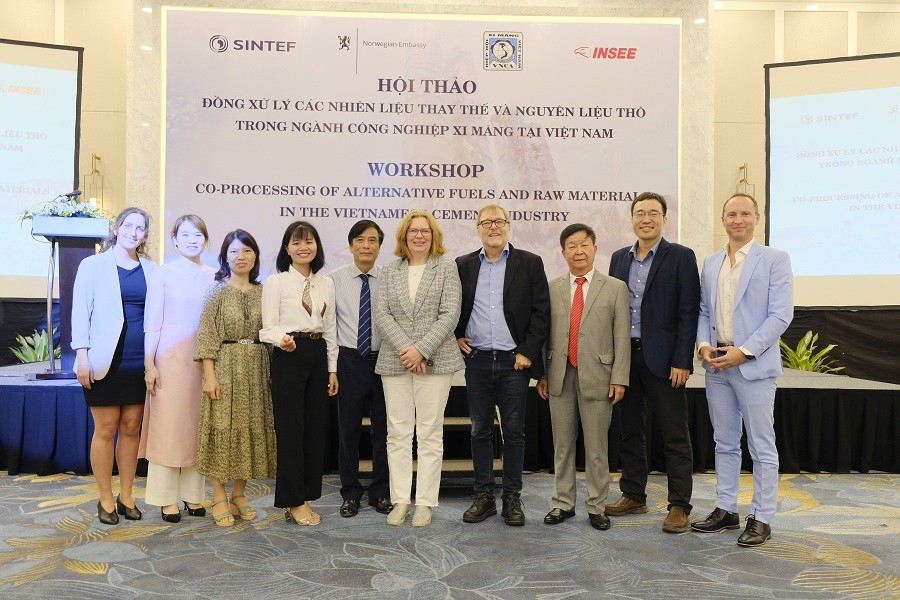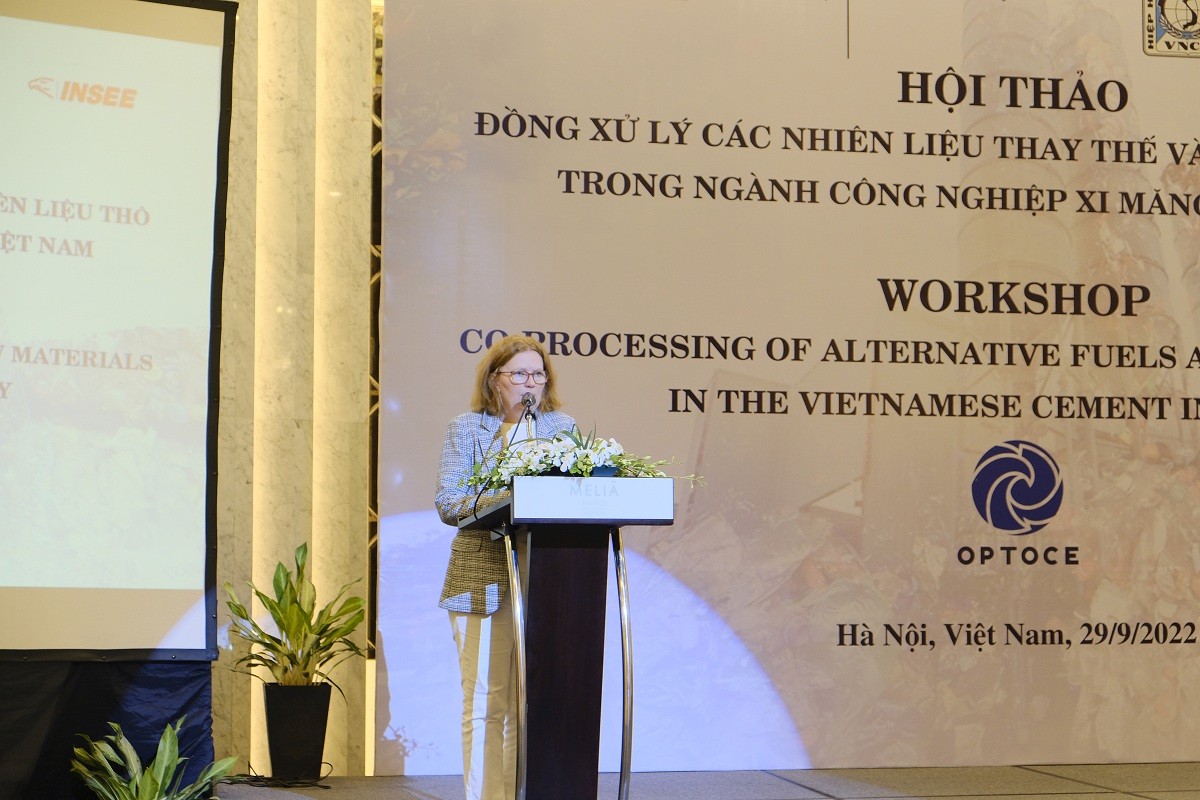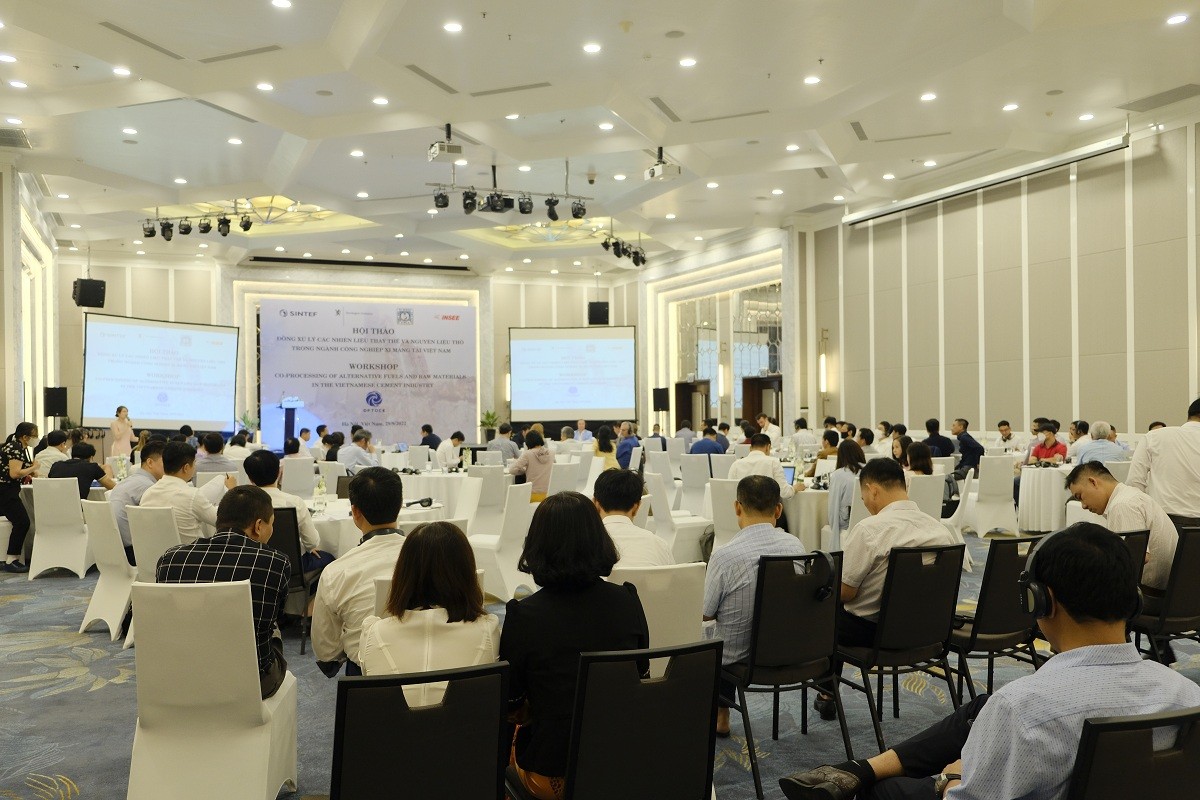
Sharing int'l experiences in co-processing of alternative fuels & raw materials in cement industry
Latest
 |
| The workshop aims at sharing international experiences in co-processing of wastes in the cement industry. (Source: SINTEF) |
The workshop aims at sharing international experiences in co-processing of wastes in the cement industry, informing the industry of the results of the recent demonstration using non-recyclable plastic wastes at the INSEE plant in Hon Chong, Kien Giang, and discussing the potential for future co-processing in the Vietnamese cement industry.
The workshop spotlights the participation of Deputy Chief of Mission (DCM) of the Norwegian Embassy in Vietnam Mette Møglestue, Chief Scientist and Programme Manager of SINTEF Dr. Kåre Helge Karstensen, VNCA Chairman Nguyen Quang Cung, Ecocycle & Sustainability Director of INSEE Ecocycle Bruno Fux, and over 130 other participants representing international organizations in Vietnam such as UNDP Vietnam, GIZ, UNIDO Vietnam, Vietnamese Ministry of Construction, Ministry of Industry and Trade, Ministry of Planning and Investment, Ministry of Natural Resources and the Environment, their local departments and members of VNCA, universities, a number of associations including Vietnam Leather, Footwear and Handbag Association, Vietnam Plastic Association, private companies working in the cement industry and relevant areas, local environmental NGOs and others.
Contribute to implementing Vietnam’s net-zero target commitment by 2050
In her opening remarks, Norwegian DCM Mette Møglestue emphasized that both Norway and Vietnam, as signatories of the Paris Agreement, are strongly committed to combating climate change and implement our National Determined Contributions (NDCs) to reduce Greenhouse Gas emissions (GhG). This requires a cross-sector involvement.
The Norwegian Government highly recognises the significant role of the academia, private sector, NGOs, and industries in this process.
"I am glad that SINTEF’s research findings about using non-recyclable plastic wastes as alternative fuels for the cement kilns have been successfully demonstrated and could be scaled up in Vietnam. Through the OPTOCE Project funded by the Norwegian Government and being implemented in five Asian countries including Vietnam, we hope that Norway can help Vietnam’s cement industry to improve its capacity to treat non-recyclable plastic wastes, and to contribute to implementing Vietnam’s net-zero target commitment by 2050”, she said.
Chief Scientist Dr. Kåre Helge Karstensen from SINTEF, who has been heading the OPTOCE Project, asserted that the cement industry requires massive volumes of coal and other raw materials. However, we can substitute part or entire of these with non-recyclable plastic wastes.
"Per our research findings, co-processing of non-recyclable plastic waste as a fuel-substitute in cement kilns does not increase emissions of dioxins while still complying with the strictest international limit values. The successful demonstration of this method in Vietnam at the INSEE plant sends a message of hope about the future of the Vietnam’s cement industry", Dr. Kåre Helge Karstensen said.
According to Dr. Kåre Helge Karstensen, co-processing in cement kilns can improve management of non-recyclable plastic waste in Vietnam. It reduces coal consumption in the cement industry and lower the need for building expensive WtE (Wastes to Energy) incinerators. More importantly, the cement industry at large can play a more important role in reducing GhG emissions and preventing plastic wastes from ending up in the oceans.
While co-processing is very popular in Europe and Norway, this is not the case in Vietnam where only a handful of cement plants are currently co-processing wastes.
According to Associate Professor, Dr Luong Duc Long (VNCA), Vietnam has 82 clinker kilns in operation, which together each year consume over 10 million tons of anthracite coal. The current rate of use of alternative fuels in the whole cement industry remains low.
"The Government of Vietnam has a policy to increase this rate by 15% by 2030 and by 30% after that. Thus, there is a huge potential for co-processing of wastes including non-recyclable plastics in the cement kiln in Vietnam”, he said.
 |
| Deputy Chief of Mission of the Norwegian Embassy in Vietnam, Ms. Mette Møglestue. (Source: SINTEF) |
Opportunities and challenges
Expressing pleasure in participating in OPTOCE's plan, Mr Bruno Fux, Ecocycle & Sustainability Director of INSEE Ecocycle said that this plan will turn plastic wastes into opportunities to develop a circular economy in Vietnam.
"INSEE Ecocycle VN has been in the co-processing business for the last 15 years. During that time, we have been investing continuously into new equipment in order to expand our waste treatment capability and capacity. Our first priority is zero harm to people and the environment. Therefore, experience and expertise are needed, especially when treating hazardous waste", he said.
According to Mr Bruno Fux, co-processing is not a new concept, but in Vietnam it is in its infant stage. There is a big opportunity for the cement industry to become a substantial solution provider for non-recyclable waste materials in a widely underdeveloped waste management infrastructure.
"We hope many of the Vietnamese cement companies would be inspired from this Workshop and become our like-minded friends. Together, we can reduce the use of fossil fuels such as coal and contribute to a greener and cleaner Vietnam,” said Mr Bruno Fux.
However, there exist a number of challenges: investments in co-processing; unavailability of entities specialized in collection and preliminary treatment of wastes for delivery to cement plants; inadequate legal procedures for recognizing plants that adopt waste co-processing as waste treatment facilities; lack of incentives and presential for the co-processing plants or the entities/enterprises in their supply chain.
Dr. Kåre Helge Karstensen added: "We acknowledge that implementing sound and safe co-processing in the cement industry takes time and will be dependent on many local and national factors and conditions, first of all: a regulatory and legislative framework must be in place, the cement company and co-processing operator must have adequate competence/knowledge, sufficient equipment and relevant licences; there must be a willingness of local and central government to support the concept, and there must be a level playing field for all players in the waste-management-market”.
The Workshop provides an effective forum for scientists, managers at both central and local levels, cement companies, entities generating non-recyclable plastic wastes, and NGOs to share information about opportunities and difficulties in application of co-processing in Vietnam.
All the participants share a wish that the Government of Vietnam would soon have in place an adequate legal framework to enable the cement industry to be a partner in improving the management of solid wastes.
Besides, it is necessary to ensure a stable and appropriate source of wastes for co-processing, which needs to be mapped out and implemented in the Vietnamese context of collection, transportation, and storage of wastes. Therefore, all kinds of assistance: techniques, facilities, human and physical resources are crucial for the cement companies to soon apply co-processing in Vietnam.
 |
| Workshop on Co-processing of Alternative Fuels and Raw Materials in the Vietnamese Cement Industry on 29 September. (Source: SINTEF) |
| OPTOCE (Ocean Plastic Turned into an Opportunity in Circular Economy) Project is a regional Project funded by the Norwegian Government and carried out in five countries: China, India, Myanmar, Thailand and Vietnam. OPTOCE aims to reduce the release of plastic wastes to the ocean by involving local energy intensive industries in waste management and energy recovery. This will increase the waste treatment capacity in Asian countries and constitute a sustainable cost-efficient option in integrated waste management. OPTOCE Project seeks to demonstrate new solutions for better waste management and circular economic thinking, and the feasibility of using public-private-partnerships to collect plastic wastes from polluted hot-spots, major rivers basins and beach front areas and to use the waste as a source of energy in local, energy intensive industries. In Vietnam, OPTOCE was launched in 2019. In December 2021, a pilot demonstration was successfully completed in the INSEE cement plant located in Hon Chong, Kien Giang province, to assess the feasibility of using non-recyclable plastic waste from Vietnam’s biggest paper recycling plant and rubber waste from shoe/footwear manufacturing as co-fuel. |




















